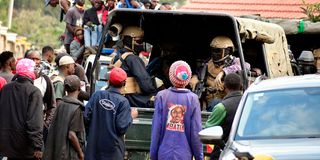
Members of the public mill around a vehicle carrying officers from Recce Squad at Nairobi Funeral Home on July 13, 2024 where bodies recovered from Kware were taken for forensic investigations.
Nairobi Funeral Home — once known as City Mortuary — is not a place of peace. It is a facility weighed down by grief, where the air carries the heavy scent of formalin and something older, something deeper.
The walls, stained with time and sorrow, seem to close in. A cold, sterile silence lingers, broken only by the occasional clang of metal trays being pulled from storage.
Here, the dead from all over the city are brought in.
"Because if they are not brought here, we will be having the dead on the streets," says Tom Nyakaba, who oversees public health facilities in Nairobi County.
Inside, fluorescent tubes flicker above, casting a harsh, lifeless glow on the rows of bodies. Some lie unclaimed for weeks, their names lost to bureaucracy, their stories known only to the morgue attendants who shuffle between rooms with practised indifference.
But it is this very noble role — providing a holding place for unidentified bodies, including those without next of kin — that has put the funeral home run by Nairobi City County under a spotlight.
The funeral parlour now stands accused of helping killer police and other rogue security agents get away with cold-blooded murders and extrajudicial killings.
Since last year, dozens of lifeless bodies of people who went missing without a trace and whose families searched for months on end were found lying in the cold storage of the mortuary.
The latest victims are Justus Mutumwa and Martin Mwau whose remains were discovered last week after going missing in Mlolongo between December 16 and 17 last year.
For the families of Steve Mbisi and Karani Mwema, friends of the slain duo, stepping into this place last Saturday was meant to bring answers. A final confirmation. And a cruel kind of closure.
They had been summoned by the attendants with the suggestion that a body resembling their loved one might be inside. And so they came, clutching onto hope. But hope does not last long in a place like this.
"We were told to come on Saturday at 10am to identify our kin. But on arrival, nothing happened," one of the relatives said, frustration cracking through his voice.
In the end, after hours of waiting, Mbisi’s family left as they had arrived — burdened, exhausted, empty-handed. No closure. No truth. Only more questions.
Opposition leaders are now calling this place a crime scene. They speak of collusion — between morgue attendants, the police, and the unseen forces that decide which stories get buried and which remain in the light.
"There is some collusion here between this institution and the police to hide bodies and the victims who have been abducted here," said politician Eugene Wamalwa, hinting at initiating a judicial process.
"They will be summoned to court. They will answer. They will have their day in court because this turns out not to be just a place for storing bodies but a crime scene where the police are colluding, abduct people, kill them, and dump them here."
Mr Wamalwa continued: "Those behind that — including the leadership of this county and this country — must be answerable."
Wiper Party leader Kalonzo Musyoka voiced his suspicions: "The police entries are talking about murder in the case of one body and the other one, death by drowning, and they want the country to believe that is actually the true story."
“The police insisted the bodies had been here since December. But if that were true, why had their families spent weeks searching, chasing dead ends? Why had no one told them sooner? And why, now, was Mbisi’s family being turned away from a body they had been discreetly told could be his?”
Nairobi Funeral Home has been a key public funeral facility since its establishment in 1957.
Once the city's primary mortuary, years of neglect led to its deteriorating conditions. But the now-defunct Nairobi Metropolitan Services (NMS) undertook major renovations, improving infrastructure, security, and water supply to enhance its operations.
In 2023, the funeral home announced plans for a private wing with a 24-body capacity, additional services such as hearses, and a chapel for funeral services.
Strategically located along Raila Odinga Way near Kenyatta National Hospital, it serves as a crucial link for families and medical institutions in Nairobi.
However, its role is now under scrutiny. In October, a tense standoff unfolded between staff and police officers when mortuary workers refused to accept more bodies.
The Nairobi County government had ordered them to turn away bodies, citing full capacity. Currently, the facility holds 607 bodies — far exceeding its capacity of 184.
Then, as it is now, for the grieving families, the truth is still locked away, hidden behind cold steel doors.
"All bodies coming to the mortuary are brought in by police," said Nyakaba, explaining that the facility maintains two registers: one for known bodies and another for unidentified ones.
Before admission, fingerprints and biometric data are taken and sent to the National Registration Bureau for matching.
Nyakaba dismissed allegations of collusion and maintained that the facility’s key role is storage of the bodies: "We have no interests in dead bodies. Our only interest is to preserve and give them dignity."
He went on: "The police determine the cause of death at the time of booking. We only conduct autopsies when families identify bodies or when we are disposing of unclaimed ones."
As of now, the facility is preparing to dispose of 354 unclaimed bodies in the coming weeks. These bodies were brought in between May and October last year, Nyakaba confirmed.
Yet, as families mourn, the questions persist. How many stories have been buried here? And how many more will never be told?






